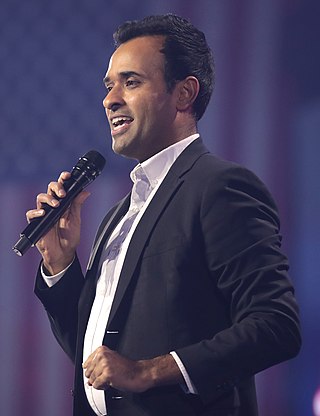Related Research Articles
Financial capital is any economic resource measured in terms of money used by entrepreneurs and businesses to buy what they need to make their products or to provide their services to the sector of the economy upon which their operation is based, e.g., retail, corporate, investment banking, etc. In other words, financial capital is internal retained earnings generated by the entity or funds provided by lenders to businesses in order to purchase real capital equipment or services for producing new goods and/or services.
Corporate governance is defined, described or delineated in diverse ways, depending on the writer's purpose. Writers focused on a disciplinary interest or context often adopt narrow definitions that appear purpose-specific. Writers concerned with regulatory policy in relation to corporate governance practices often use broader structural descriptions. A broad (meta) definition that encompasses many adopted definitions is "Corporate governance describes the processes, structures, and mechanisms that influence the control and direction of corporations."
Management consulting is the practice of providing consulting services to organizations to improve their performance or in any way to assist in achieving organizational objectives. Organizations may draw upon the services of management consultants for a number of reasons, including gaining external advice and accessing consultants' specialized expertise regarding concerns that call for additional oversight.
An activist shareholder is a shareholder who uses an equity stake in a corporation to put pressure on its management. A fairly small stake may be enough to launch a successful campaign. In comparison, a full takeover bid is a much more costly and difficult undertaking. The goals of activist shareholders range from financial to non-financial. Shareholder activists can address self-dealing by corporate insiders, although large stockholders can also engage in self-dealing to themselves at the expense of smaller minority shareholders.
Shareholder value is a business term, sometimes phrased as shareholder value maximization. It became prominent during the 1980s and 1990s along with the management principle value-based management or "managing for value".

BlackRock, Inc. is an American multi-national investment company based in New York City. Founded in 1988, initially as a risk management and fixed income institutional asset manager, BlackRock is the world's largest asset manager, with US$10 trillion in assets under management as of January 2022. BlackRock operates globally with 70 offices in 30 countries, and clients in 100 countries. Along with Vanguard and State Street, BlackRock is considered to be one of the Big Three index fund managers that dominate America.
William H. Miller III is an American investor, fund manager, and philanthropist. He served as the chairman and chief investment officer of Legg Mason Capital Management as well as the principal portfolio manager of the Legg Mason Capital Management Value Trust. He is the portfolio manager of the former Legg Mason Opportunity Trust mutual funds, now housed at his own firm Miller Value Partners.
Valuation using discounted cash flows is a method of estimating the current value of a company based on projected future cash flows adjusted for the time value of money. The cash flows are made up of those within the “explicit” forecast period, together with a continuing or terminal value that represents the cash flow stream after the forecast period. In several contexts, DCF valuation is referred to as the "income approach".
Corporate communication is a set of activities involved in managing and orchestrating all internal and external communications aimed at creating favourable point of view among stakeholders on which the company depends. It is the messages issued by a corporate organization, body, or institute to its audiences, such as employees, media, channel partners and the general public. Organizations aim to communicate the same message to all its stakeholders, to transmit coherence, credibility and ethics.

Perella Weinberg Partners L.P. is an American global financial services firm focused on investment banking advisory services.
L.E.K. Consulting is a global strategy consulting firm based in London and Boston. Founded in 1983 by three partners from Bain & Company, L.E.K. focuses on corporate strategy, marketing and sales, mergers and acquisitions, and operations. It provides expertise to life sciences and pharma, healthcare services, consumer products, financial services, energy and environment, media and entertainment, technology, travel and transport, industrials, and retail. The firm also has a strong private equity practice.
Creating shared value (CSV) is a business concept first introduced in a 2006 Harvard Business Review article, Strategy & Society: The Link between Competitive Advantage and Corporate Social Responsibility. The concept was further expanded in the January 2011 follow-up piece entitled Creating Shared Value: Redefining Capitalism and the Role of the Corporation in Society. Written by Michael E. Porter, a leading authority on competitive strategy and head of the Institute for Strategy and Competitiveness at Harvard Business School, and Mark R. Kramer, of the Kennedy School at Harvard University and co-founder of FSG, the article provides insights and relevant examples of companies that have developed deep links between their business strategies and corporate social responsibility (CSR). Porter and Kramer define shared value as "the policies and practices that enhance the competitiveness of a company while simultaneously advancing social and economic conditions in the communities in which it operates", while a review published in 2021 defines the concept as "a strategic process through which corporations can turn social problems into business opportunities".

The Friedman doctrine, also called shareholder theory is a normative theory of business ethics advanced by economist Milton Friedman which holds that the social responsibility of business is to increase its profits. This shareholder primacy approach views shareholders as the economic engine of the organization and the only group to which the firm is socially responsible. As such, the goal of the firm is to increase its profits and maximize returns to shareholders. Friedman argues that the shareholders can then decide for themselves what social initiatives to take part in, rather than have an executive whom the shareholders appointed explicitly for business purposes decide such matters for them.
Enterprise engagement is a sub-discipline of marketing and management that focuses on achieving long-term financial results by strategically fostering the proactive involvement and alignment of customers, distribution partners, salespeople, and all human capital outside and inside of an organization. Enterprise engagement is distinct from the traditional sub-disciplines of financial management, marketing, sales, operations, and human resources in that it seeks to achieve long-term success by integrating these various traditional business disciplines to consistently focus the organization on identifying and meeting target audience needs. Enterprise Engagement is related to brand engagement, a term developed in Great Britain in the 2000s to describe an integrated external and internal marketing approach to achieving long-term success for a brand. Enterprise Engagement applies similar principals to the achievement of an organization's overall financial objectives.
Environmental, social, and corporate governance (ESG), also known as environmental, social, governance, is a framework designed to be embedded into an organization's strategy that considers the needs and ways in which to generate value for all organizational stakeholders.
Michael J. Mauboussin heads consilient research at Morgan Stanley division Morgan Stanley Investment Management's Counterpoint Global, an open-end mutual fund. Previously, he was director of research at BlueMountain Capital and head of global financial strategies at Credit Suisse, where he advised clients on valuation and portfolio positioning, capital markets theory, competitive strategy analysis, and decision making. He is also an adjunct professor of finance at the Columbia Business School and serves as chairman emeritus of the board of trustees at the Santa Fe Institute, a multi-disciplinary research center for complex adaptive systems, after serving as its chairman from 2012 until retiring in May 2021.

Guy Spier is a Zurich-based investor. He is the author of The Education of a Value Investor. Spier is the manager of the Aquamarine Fund with $350 million in assets. He is well known for bidding US$650,100 with Mohnish Pabrai for a charity lunch with Warren Buffett in 2008. In 2009, he was featured in The Checklist Manifesto, by Atul Gawande regarding his use of checklists as part of his investment process. His the brother of Tanya de Jager.

Corporate finance is the area of finance that deals with the sources of funding, and the capital structure of corporations, the actions that managers take to increase the value of the firm to the shareholders, and the tools and analysis used to allocate financial resources. The primary goal of corporate finance is to maximize or increase shareholder value.
In business, a unicorn is a privately held startup company valued at over US$1 billion. The term was first published in 2013, coined by venture capitalist Aileen Lee, choosing the mythical animal to represent the statistical rarity of such successful ventures.

Vivek Ganapathy Ramaswamy is an American entrepreneur, author, and conservative political activist. The author of Woke, Inc. (2021) and Nation of Victims (2022), he was labeled "one of the intellectual godfathers of the anti-woke movement" by Politico.
References
- ↑ "Interview: Alfred Rappaport of Saving Capitalism from Short-Termism". GMI Ratings. Retrieved 9 January 2015.
- ↑ Rappaport, A (31 March 2016). "Analyze this". The Economist. Retrieved 9 July 2021.
- ↑ "Creating Shareholder Value: The New Standard for Business Performance". Simon and Schuster. Archived from the original on 2021-08-05. Retrieved 2021-07-03.
- 1 2 3 "ABOUT THE AUTHORS". Expectations Investing. Retrieved 3 July 2021.
- 1 2 3 "Hyperion to acquire Alcar". Silicon Valley Business Journals. 3 April 2003. Retrieved 9 July 2021.
- ↑ Wayne, Leslie (23 April 1987). "'REVERSE LBO'S' BRING RICHES". New York Times. Retrieved 9 July 2021.
- ↑ "L.E.K. Consulting adds seven new partners globally". www.consultancy.uk. 2015-01-22. Retrieved 2021-03-11.
- ↑ Rappaport, Alfred (1999-10-13). Creating Shareholder Value: A Guide For Managers And Investors. Simon and Schuster. ISBN 978-0-684-84456-5.
- ↑ Rappaport, Alfred (25 February 1998). "Here Are Three Ways Investors Can Stack the Odds in Their Favor". The Wall Street Journal. Retrieved 10 July 2021.
- ↑ Kilroy, Denis; Schneider, Marvin (2017). Customer Value, Shareholder Wealth, Community Wellbeing: A Roadmap for Companies and Investors. Springer. p. 5. ISBN 9783319547749.
The main advocates of shareholder wealth creation as a governing objective were value-based management consulting firms like Marakon Associates, Stern Stewart & Co, and Alcar, together with the academics that stood behind their work such as Dr Bill Alberts, Joel Stern and Professor Al Rappaport.
- ↑ "alfred rappaport". hbr.org. Harvard Business Review. Retrieved 7 July 2021.
- ↑ Rappaport, A. and Mauboussin, M. Expectations Investing
- ↑ Rappaport, A., Ten Ways to Create Shareholder Value, Harvard Business Review, September 2006, accessed 22 February 2017